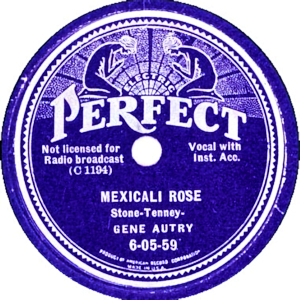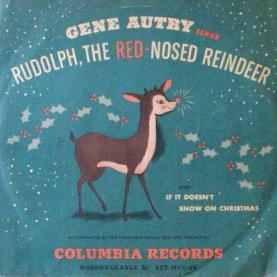Related Research Articles

Orvon Grover "Gene" Autry, nicknamed the Singing Cowboy, was an American actor, musician, singer, composer, rodeo performer, and baseball team owner, who largely gained fame by singing in a crooning style on radio, in films, and on television for more than three decades, beginning in the early 1930s. During that time, he personified the straight-shooting hero — honest, brave, and true.

Liberty Records was a record label founded in the United States by chairman Simon Waronker in 1955 with Alvin Bennett as president and Theodore Keep as chief engineer. It was reactivated in 2001 in the United Kingdom and had two previous revivals.

The Champs are an American rock and roll band, most famous for their Latin-tinged 1958 instrumental single "Tequila". The group took their name from that of Gene Autry's horse, Champion, and was formed by studio executives at Autry's Challenge Records to record a B-side for the Dave Burgess single, "Train to Nowhere". The intended throwaway track became more famous than its A-side, as "Tequila" went to No. 1 in just three weeks, and the band became the first group to go to the top spot with an instrumental that was their first release. The song was recorded at Gold Star Studios in fall 1957, and in 1959 won the Grammy Award for Best R&B Performance. It sold over one million copies, and was awarded a gold disc by the RIAA.

The Knickerbockers were an American garage rock band formed in Bergenfield, New Jersey in 1964. They released the 1965 hit "Lies", which was known for its resemblance to the Beatles. The band was formed in 1964 by the brothers Beau Charles and John Charles
Hot Butter were an American instrumental band fronted by the keyboard player and studio musician Stan Free. The other band members were John Abbott, brothers Bill and Steve Jerome, Danny Jordan (producer) and Dave Mullaney ; also joined in studio by Tony Spinosa (percussion). They were best known for their 1972 version of the Moog synthesizer instrumental song "Popcorn", originally recorded by its composer, Gershon Kingsley, in 1969. The track became an international hit, selling a million copies in France, 250,000 in the United Kingdom, and over two million worldwide.

"Tequila" is a 1958 Latin-inspired surf instrumental song written by Chuck Rio and recorded by American rock and roll band The Champs. "Tequila" became a No. 1 hit on both the pop and R&B charts at the time of its release and continues to be strongly referenced in pop culture to this day.
Daniel Flores, also known by his stage name Chuck Rio, was an American Rock and roll saxophonist. He is best remembered for his self-penned song "Tequila", which he recorded with The Champs, the band of which he was a member at the time, and which reached number one on the Billboard Hot 100.
"Boom Boom Baby" is a song written by Dave Burgess. It became a number one hit in Australia when it was recorded by Crash Craddock in 1959. It was released on the Columbia label in the United States and was released on the Coronet label in Australia. The flip side of the record, "Don't Destroy Me", reached #94 on the charts in the U.S.

"Raunchy" is an instrumental by American rock and roll artist Bill Justis, co-written with Sidney Manker and produced by Sam Phillips. The tune, from the album Cloud 9, was released as a single on the record label Phillips International Records, a sub-label of Sun Records, on September 23, 1957.
"Someday You'll Want Me to Want You" is a popular song published in 1944 by Jimmie Hodges. The song became a standard, recorded by many pop and country music singers.

"Mexicali Rose" is a popular song composed by bandleader and pianist Jack Breckenridge Tenney in the early 1920s, when he and his seven piece orchestra played the hotels and clubs of the Calexico and Mexicali border. The song became a hit in the mid-1930s, thanks to Gene Autry and Bing Crosby, around the same time that Tenney became a lawyer and was elected to the California State Assembly. Tenney was later appointed to head of the California Senate Factfinding Subcommittee on Un-American Activities.

"Here Comes Santa Claus (Right Down Santa Claus Lane)" is a popular Christmas song originally performed by Gene Autry, with music composed by Autry, Oakley Haldeman and Harriet Melka. Autry's original recording (in which he pronounces Santa Claus as "Santy Claus") was a top-10 hit on the pop and country charts; the song would go on to be covered many times in the subsequent decades.
Jerrell Lee Fuller was an American songwriter, singer, and record producer, best known for writing several hit songs in the 1960s.

The Royal Teens were an American rock and roll band that formed in New Jersey in 1956 and originally consisted of Bob Gaudio on piano, Tom Austin on drums, Billy Dalton on guitar, and Billy Crandall on saxophone. The group is best known for its single "Short Shorts", which was a number 3 hit in the United States in 1958. The follow-up single, 1959's "Believe Me", hit number 26. They never recorded an album, and broke up in 1965.

"Rudolph, the Red-Nosed Reindeer" is a song by songwriter Johnny Marks based on the 1939 story Rudolph the Red-Nosed Reindeer published by the Montgomery Ward Company. Gene Autry's recording hit No. 1 on the U.S. charts the week of Christmas 1949.

"That Silver Haired Daddy of Mine" was Gene Autry's first hit record in 1932, written and performed with fellow railroadman Jimmy Long. Thanks to his new career as a singing cowboy in 1935, it became one his biggest

"Lucky Star" is a 1961 song by Dave Burgess, first recorded as a B-side by Ricky Nelson but better known in the A-side version by Gene Vincent.
The Kuf-Linx were an American rock and roll vocal group, active in the 1950s. Other groups used similar names at the same time, and even recorded some of the same songs, causing some confusion. Band members included John Jennings, Johnny Woodson (tenor), Gaines Steele (tenor), George "Biggy" McFadden (bass), Leo Z. Manley, Darrell Johnson, and Gwen Johnson. Jennings and McFadden had been in the Jubalaires together.
Dave Burgess is an American guitar player, singer, songwriter, and band leader of The Champs.
"Sail Along, Silv'ry Moon" is a song written by Harry Tobias and Percy Wenrich in 1937 and performed by Bing Crosby. It reached #4 on the U.S. pop chart in 1937. Outside of the US, the song peaked at #1 in Canada, Germany and Norway.
References
- ↑ Whitburn, Joel (2004). Top R&B/Hip-Hop Singles: 1942–2004. Record Research. p. 109.
- ↑ Huelyn Duvall. "Memories of the Tequila Recording Session" . Retrieved August 21, 2006.
- ↑ Grobaty, Tim. "Danny Flores Remembered". Spectropop. Retrieved November 26, 2013.
- ↑ Bob Morris (2) discography at Discogs